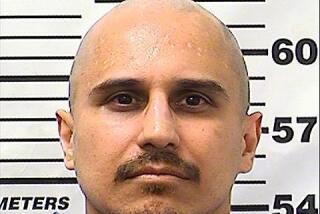After homelessness, a single mother works to build a secure future

- Share via
Six months ago, Sandra Martinez was homeless. Now, she lives in an apartment, works two jobs and wants to map out a solid financial future for herself and her three young sons.
“I don’t want my children to make the same mistakes I made,” Martinez said. “I want them to have a good life. I want to give that to them.”
To do that, Martinez, 23, is setting a difficult pace.
In October, the family moved from a shelter into a three-bedroom apartment in a new subsidized building in Koreatown.
During the week, she is an outreach worker for the homeless covering Los Angeles’ skid row area, sometimes joining the emergency outreach teams that help get people off the streets and into shelters. On weekends, she is a barrista at Starbucks.
The aim is to eventually earn her way to the point, Martinez said, where she isn’t dependent on social services, such as rent subsidies, free day care for her sons and food stamps. She dreams of a house with a backyard for the boys to play in, a return to college and a degree that will bring financial independence.
Certified financial planner Alfred McIntosh reviewed Martinez’s financial situation and decided she needed a money primer to get her thinking about spending, savings, credit and insurance, among other things.
“One of the things people relying on public benefits don’t realize is that they will not only have to get a better-paying job to move ahead of their current situation. It will also have to pay her enough to cover expensive costs she doesn’t face right now, like day care and food for her family,” McIntosh said.
“That is one of the reasons why some people try to stay” in the public benefits system for as long as they can “because it is so difficult. She should be commended for having the courage to try,” said the fee-only planner, principal of McIntosh Capital Advisors Inc. in West Los Angeles.
Martinez grew up in Joshua Tree but left her family’s Inland Empire home in her teens and moved in with friends. When she was old enough to apply for jobs, she was willing to do almost anything, holding as many as three jobs at the same time.
“I might have worked everywhere it was possible to work,” Martinez joked.
Martinez reeled off a long string of low-wage jobs at fast-food restaurants, small businesses, retailers and more. Martinez also worked around warehouses, loading and unloading freight from cargo trucks.
By age 18, Martinez’s tough route to independence seemed to be paying off. She had enough money saved to start taking community college classes in the hope of capitalizing on what is perhaps her biggest asset: Growing up in a household with two deaf parents made her proficient at sign language, a valuable skill, according to the Bureau of Labor Statistics.
“Interpreters for the deaf will continue to have favorable employment prospects because there are relatively few people with the needed skills,” the BLS notes, with median annual pay for interpreters and translators of $45,430. A college degree is required for the best jobs.
But by 19, her life was going downhill fast. Martinez dropped out of school.
As she puts it, “I started hanging out with the wrong crowd,” including some members of a street gang.
By the next year, she had nowhere to live. Landing in a homeless shelter for families clarified her thinking, Martinez said. Caseworkers from the Los Angeles Homeless Services Authority helped her begin rebuilding her life.
Although she has gotten some stability, “there never seems to be any money left at the end of the month. I’m not getting ahead. I don’t know anything about living on a budget.”
Martinez is earning slightly more than $1,400 a month, after taxes, well below the federal poverty line for a family of four, which is $23,850 in earnings a year.
She qualifies for free day care for her sons — ages 7, 2 and 6 months — something that McIntosh said will be difficult to afford once she steps away from public assistance. She also gets $600 a month in food stamps.
Martinez has already managed to save $8,250, partially from a tax return. She drives a balky 1995 Honda Civic that has more than 250,000 miles on it and is frequently in need of repair.
When she dreams of the future, it includes earning enough to buy a home in Joshua Tree. “It has a backyard,” Martinez said, “where my family can enjoy themselves.”
It’s also a future that includes a career as a sign language interpreter.
McIntosh said Martinez must deal with realities before dreams; she must first “ think about what will happen to her children if the worst occurs and she is no longer around to care for them.”
He suggested a $650,000, 20-year term life insurance policy, which he said should cost around $28.50 a month. As a fee-only planner, McIntosh doesn’t receive commissions for recommending investments.
Next, McIntosh said, Martinez needs to think carefully about who in her life would make a good guardian.
“I’m suggesting she contact the Legal Aid Foundation of Los Angeles for help in working out a way to ensure that the [insurance] money is set aside and protected in the event of a tragedy,” McIntosh said.
“That is really important,” McIntosh said. “She doesn’t want her kids falling into the county social services system and likely being broken up as a family.”
Martinez’s self-confidence has likely been rocked by her family’s stint in a homeless shelter, McIntosh said, which may be hindering her search for higher pay.
“She needs to take better advantage of the fact that she is a very likable person,” McIntosh said. “She has the kind of welcoming personality and great smile that might make her an ideal salesperson.”
Martinez needs to carefully monitor her spending over the next couple of months.
“Most people don’t really have any idea of what they spend every month, and it’s usually more than they think,” McIntosh said. Credit is another thing that Martinez should start working on soon, McIntosh said.
“She needs to get a secured credit card that requires a deposit,” McIntosh said, “where the credit limit on the card is equal to the amount she has deposited, which serves as a kind of collateral.”
The planner wants her to “use it judiciously, like one small purchase a month, and pay it off every month,” to build up her credit rating. A good credit rating is important if Martinez needs to take out a loan. Landlords and employers also have been known to check applicants’ credit ratings.
Martinez should put some of her savings to work for her children’s education, placing $1,000 in a 529 tax-advantaged plan for college for her oldest boy, another $850 for the second-oldest and $600 for the baby. She should add to those savings plans as her income improves, he said.
McIntosh said that Martinez is spending so much to keep her Honda running that she would be better off using the money for a car payment “and having much more reliable transportation.”
Martinez has no smartphone, computer or home Internet access. The planner said she should invest in a tablet computer, which can be bought for as little as $50 to $60 on Amazon.com. Then he wants her to use it with home budgeting apps to track her spending. She could also use it to take online college courses.
Her remaining savings should be placed in a savings account at an online bank, which may offer the best interest rates.
McIntosh also wants Martinez to take advantage of programs offered by the Southern California Counseling Center to learn parenting skills.
“Raising three children is difficult under any circumstances, and hers are tougher than many,” he said.
Martinez said the future “looks scary.” She knows she can’t falter as she did in the past.
“I needed a plan,” she said. “Now I have one. Now, I have to follow it.”
Twitter: @RonWLATimes
Money Makeover highlights
Who: Sandra Martinez, 23
Estimated 2014 income: $18,330
Assets: $8,500
Debts: None
Goals: Earn more. Learn how to live on a budget. Save enough to eventually own a home. Begin to save for her children’s college costs. Finish her college degree.
Recommendations: Use her sign language skills, backed by at least an associate’s degree, to find a better-paying job. Get life insurance. Select guardians for her three sons who would care for them if something happened to her. Buy an inexpensive tablet to track the family budget. Open college savings accounts for her children. Get a more dependable car.
About the planner: Alfred McIntosh is the principal of McIntosh Capital Advisors Inc. in West Los Angeles.
::
Do you need a money makeover? The Sunday Business section gives readers a chance to have their financial situations sized up by a professional advisor at no charge. To be considered, send an email to makeover@latimes.com. You also can send a letter to Makeover, Business Section, Los Angeles Times, 202 W. 1st St., Los Angeles, CA 90012. Include a brief description of your financial goals and a daytime phone number. Information you send us will be shared with others.
More to Read
Inside the business of entertainment
The Wide Shot brings you news, analysis and insights on everything from streaming wars to production — and what it all means for the future.
You may occasionally receive promotional content from the Los Angeles Times.











